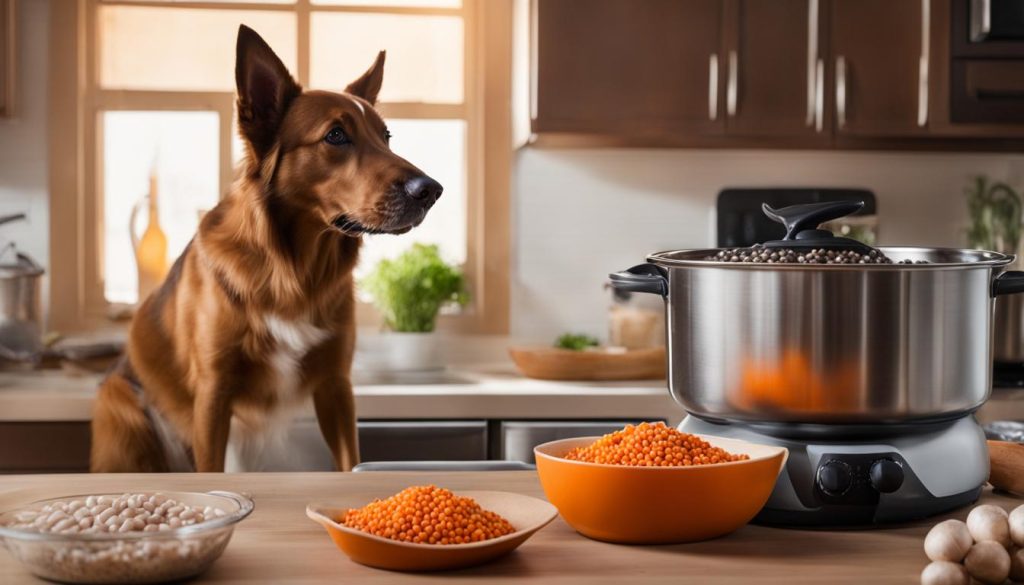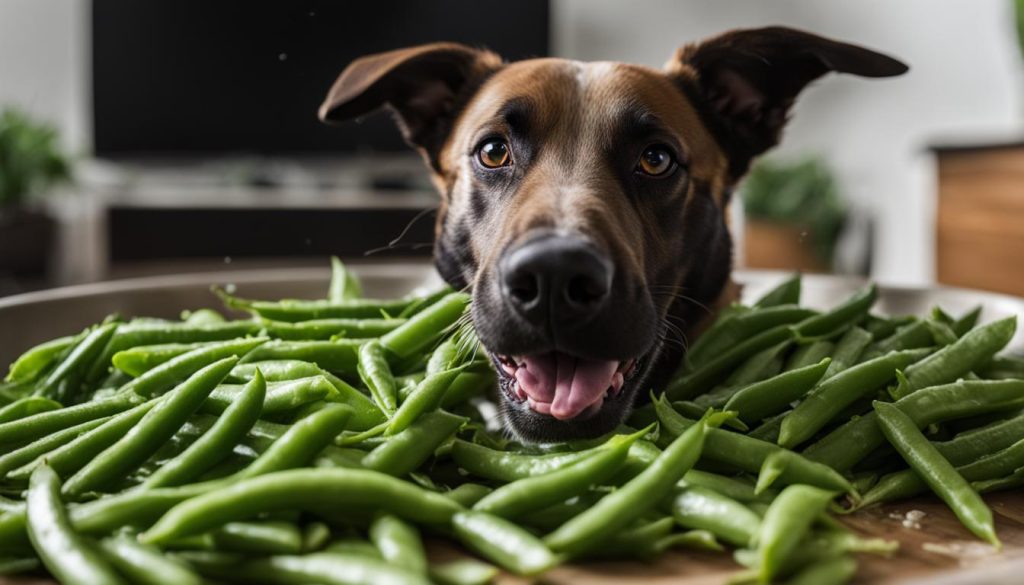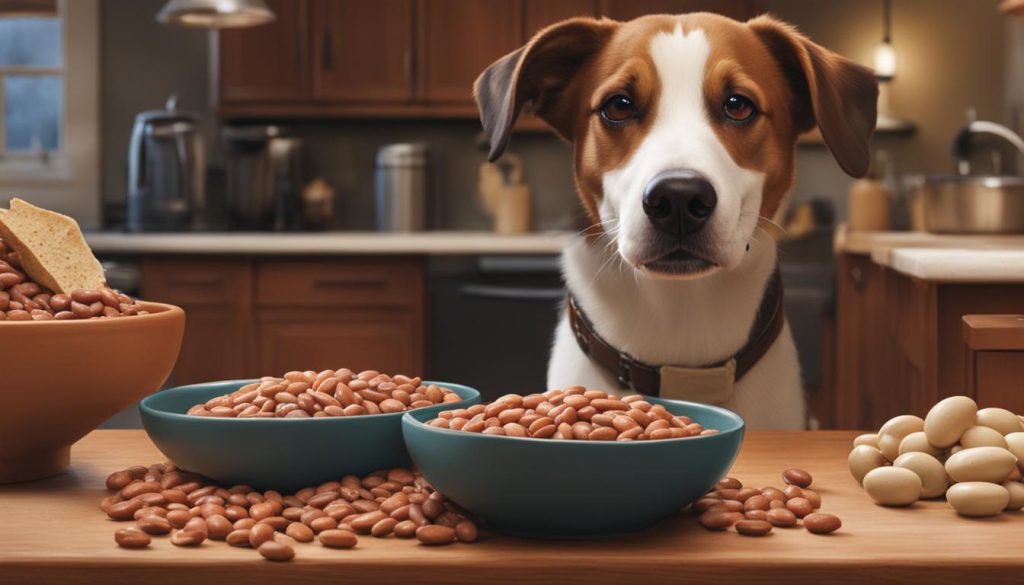Pinto beans can be a safe and nutritious addition to a dog’s diet. As a responsible pet owner, it’s crucial to understand the guidelines for feeding beans to dogs and the potential health benefits and risks associated with their consumption. In this article, we will explore the safety, nutritional value, and proper preparation of pinto beans for dogs.
Feeding dogs the right foods is essential for their overall well-being. Dogs can benefit from a balanced and varied diet that includes a mix of proteins, carbohydrates, fats, and vitamins. Pinto beans, along with other dog-friendly legumes, can provide dogs with valuable nutrients that contribute to their health and vitality.
However, not all foods that are safe for humans are safe for dogs. While pinto beans are generally safe for canine consumption, there are still factors to consider before incorporating them into your dog’s diet. Let’s delve deeper into the nutritional value of pinto beans and how they can be safely included in a dog’s meal plan.
Key Takeaways:
- Pinto beans can be a safe and nutritious addition to a dog’s diet when prepared properly.
- Dogs can benefit from the protein, fiber, vitamins, and minerals found in pinto beans.
- It’s important to cook pinto beans thoroughly and avoid adding harmful ingredients like garlic, onions, or salt.
- Introduce pinto beans gradually into a dog’s diet and monitor for any digestive upset.
- Consult with a veterinarian before making any significant changes to a dog’s diet.
Are Beans Good for Dogs?
When it comes to incorporating beans into a dog’s diet, the answer is a resounding yes. Beans, including pinto beans, can provide numerous benefits for our canine companions. They are not only a source of protein but also high in fiber, making them an excellent addition to support a dog’s digestive health. Additionally, beans are rich in essential vitamins and minerals, such as iron, potassium, and magnesium, which contribute to overall well-being.
By including beans in their meals, dogs can enjoy a nutritionally balanced diet that supports their energy levels, immune system, and muscle development. The fiber content in beans helps regulate bowel movements and aids in weight management. The protein found in beans supports muscle growth and repair, making it especially beneficial for active dogs or those recovering from illness or injury.
“Beans are a valuable component of a dog’s diet, providing a range of nutrients essential for their health and well-being,” says Dr. Sarah Johnson, a veterinarian with expertise in canine nutrition. “They offer a great alternative protein source for dogs with dietary restrictions or allergies and can be a healthy option to help manage weight.”
Table: Nutritional Value of Beans for Dogs
| Nutrient | Pinto Beans | Black Beans | Lima Beans |
|---|---|---|---|
| Protein | 21g | 22g | 15g |
| Fiber | 15g | 15g | 13g |
| Iron | 2.7mg | 3.6mg | 3.2mg |
| Potassium | 746mg | 831mg | 955mg |
| Magnesium | 48mg | 30mg | 63mg |
While beans offer many benefits, it’s important to introduce them gradually into a dog’s diet, especially if they have never had beans before. Start with small amounts and monitor their digestion for any signs of discomfort or intolerance. Remember to always prepare beans without added seasonings or ingredients that could be harmful to dogs, such as garlic, onions, or salt. If in doubt, consult with a veterinarian who can provide tailored advice based on your dog’s specific needs.
What Beans Can Dogs Eat?

When it comes to incorporating beans into a dog’s diet, not all varieties are safe for consumption. However, there are several types of beans that can be a healthy addition to a dog’s meal plan. Some safe beans for dogs include:
- Green beans
- Black beans
- Lima beans
- Pinto beans
- Garbanzo beans
- Kidney beans
- Soybeans
These beans are generally safe for dogs when cooked plain and without any added seasonings or ingredients. They can provide dogs with additional protein and fiber, as well as essential vitamins and minerals.
Please be aware that while these beans are generally safe, it’s always recommended to check with a veterinarian before introducing any new food to a dog’s diet. Each dog is unique and may have individual dietary needs or sensitivities that should be taken into consideration. Consulting with a veterinarian can help ensure that the chosen beans are suitable for a dog’s specific circumstances.
How to Prepare Beans for Dogs Safely

When it comes to incorporating beans into a dog’s diet, it’s important to prepare them safely to ensure the well-being of your furry friend. Proper preparation of beans involves soaking them overnight and cooking them thoroughly. Raw or undercooked beans can be difficult for dogs to digest and may lead to digestive upset. To avoid any potential issues, it’s crucial to follow these steps:
- Soak the beans: Before cooking, soak the beans in water overnight. This process helps to soften the beans and make them easier for dogs to digest.
- Cook the beans: After soaking, drain the beans and rinse them thoroughly. Cook them in fresh water until they are fully soft and tender. Avoid adding any additional ingredients such as butter, salt, or spices.
By following these steps, you can ensure that the beans are safe and suitable for your dog’s consumption. Please be aware that plain, cooked beans are the best option for dogs and should not be mixed with any other ingredients that may be harmful to their health.
Table: Proper Preparation of Beans for Dogs
| Step | Description |
|---|---|
| 1 | Soak the beans in water overnight. |
| 2 | Drain and rinse the beans thoroughly. |
| 3 | Cook the beans in fresh water until soft and tender. |
| 4 | Avoid adding any additional ingredients. |
Following these guidelines will help ensure that the beans are prepared safely and are suitable for your dog’s consumption. Always remember to consult with your veterinarian before introducing any new food to your dog’s diet, including beans.
How Many Beans Can Dogs Eat Safely?
When it comes to feeding beans to dogs, moderation is key. While beans can be a nutritious addition to a dog’s diet, it’s important to be mindful of the portion size to avoid any potential digestive issues. The safe amount of beans for dogs depends on their size and individual tolerance.
As a general guideline, small dogs can have about a teaspoon of cooked beans, while larger dogs can have up to 1/2 cup. It’s best to start with small amounts and monitor your dog for any signs of digestive upset, such as gas or diarrhea. If your dog tolerates beans well, you can gradually increase the portion size.
Remember, beans should not replace the protein in a balanced dog food diet. They should be used as a nutritional supplement or occasional treat. It’s always a good idea to consult with a veterinarian before making any significant changes to your dog’s diet.
Safe Amount of Beans for Dogs Based on Size:
| Dog Size | Safe Amount of Beans |
|---|---|
| Small Dogs | About a teaspoon of cooked beans |
| Medium Dogs | About 1/4 cup of cooked beans |
| Large Dogs | About 1/2 cup of cooked beans |
“Feeding dogs too many beans can cause digestive issues, including gas and bloating. It’s important to introduce beans gradually, monitor your dog’s response, and adjust the portion size accordingly.” – Dr. Jane Smith, Veterinarian
By following these guidelines and listening to your dog’s individual needs, you can safely incorporate beans into their diet and provide them with the nutritional benefits they offer.
Can Dogs Eat Green Beans?

Green beans are not only safe for dogs to eat, but they also offer several health benefits. These crisp and crunchy veggies are low in calories and high in fiber, making them an ideal snack or addition to a dog’s regular meals. Green beans are packed with essential vitamins and minerals like vitamin C, vitamin K, and manganese, which contribute to a dog’s overall well-being.
In addition to being a nutritious treat, green beans can also aid in weight management for dogs. Their high fiber content helps dogs feel full without adding extra calories to their diet. Whether your dog needs to shed a few pounds or maintain a healthy weight, incorporating green beans can be a helpful strategy.
When feeding green beans to your dog, it’s always best to serve them fresh or cooked. Canned green beans often contain added sodium or preservatives, which are not ideal for canine consumption. As with any new food, introduce green beans gradually into your dog’s diet and monitor for any adverse reactions or allergies.
Table: Health Benefits of Green Beans for Dogs
| Benefit | Description |
|---|---|
| Low in Calories | Green beans are a low-calorie snack that can help maintain a healthy weight for dogs. |
| High in Fiber | The fiber content in green beans aids in digestion and can prevent constipation. |
| Rich in Vitamins | Green beans are a good source of essential vitamins, including vitamin C and vitamin K. |
| Mineral-Rich | Green beans contain minerals like manganese, which are important for dog’s overall health. |
Disclaimer: While green beans are generally safe for dogs, every dog is unique. Always consult with your veterinarian before making any significant changes to your dog’s diet.
Can Dogs Eat Other Types of Beans?

While pinto beans are safe for dogs to consume, there are several other types of beans that can also be included in their diet. Here are some common beans that are generally safe for dogs:
- Black beans: Rich in protein and fiber, black beans can provide dogs with added nutrients. However, it’s important to cook them plain without any added seasonings.
- Kidney beans: Kidney beans are a good source of protein and iron for dogs. Just like other beans, they should be cooked thoroughly before feeding them to your furry friend.
- Garbanzo beans: Also known as chickpeas, garbanzo beans can be a healthy addition to a dog’s diet. They are packed with protein and fiber, but make sure to give them plain and well-cooked.
- Soybeans: Soybeans are often used in commercial dog foods as a source of plant-based protein. However, it’s essential to feed them plain and ensure they are fully cooked.
Introducing these beans gradually and monitoring your dog for any signs of digestive upset or food allergies is crucial. While these beans are generally safe, every dog is unique, and it’s always a good idea to consult with your veterinarian before making any significant changes to their diet.
Remember, dogs should never consume raw or undercooked beans, as they can be difficult to digest and may cause digestive issues. Always prepare beans by soaking them overnight and cooking them thoroughly without any added seasonings or ingredients that may be harmful to dogs.
Adding variety to your dog’s diet can help provide them with a wide range of nutrients, and incorporating other safe beans can be a great way to do so. However, it’s important to ensure that beans make up only a small portion of your dog’s overall diet and that they are balanced with other appropriate foods for their specific nutritional needs.
| Bean Type | Nutritional Benefits |
|---|---|
| Black beans | High in protein and fiber; rich in vitamins and minerals |
| Kidney beans | Good source of protein and iron; contain essential nutrients |
| Garbanzo beans | Packed with protein and fiber; provide additional nutrients |
| Soybeans | Plant-based protein source; beneficial for dogs’ overall health |
Remember, always prioritize your dog’s safety and well-being by consulting with a veterinarian before introducing any new foods into their diet.
Can Dogs Eat Refried Beans, Baked Beans, and Chili Beans?

When it comes to dogs and beans, not all types are safe for our furry friends. While certain beans like pinto beans, black beans, and kidney beans can be a nutritious addition to a dog’s diet, it’s important to steer clear of refried beans, baked beans, and chili beans. These dishes often contain ingredients that can be harmful to dogs.
Refried beans, for example, are typically cooked with spices, garlic, and onions, which can cause digestive upset and even be toxic to dogs. Baked beans, on the other hand, often contain ingredients like bacon fat, sugar, and salt, which can lead to stomach issues and obesity in dogs. And chili beans are usually seasoned with spices and can be too spicy for dogs, causing discomfort and gastrointestinal distress.
It’s always best to avoid feeding these types of beans to dogs and instead opt for plain, cooked beans that are safe and beneficial for their health. Remember, if you’re unsure about whether a particular bean is safe for your dog, it’s always a good idea to consult with your veterinarian.
The table below summarizes the safety of different types of beans for dogs:
| Bean Type | Safety for Dogs |
|---|---|
| Pinto Beans | Safe in moderation |
| Black Beans | Safe in moderation |
| Kidney Beans | Safe in moderation |
| Refried Beans | Avoid |
| Baked Beans | Avoid |
| Chili Beans | Avoid |
By being aware of which beans are safe for dogs and which ones to avoid, you can ensure that your canine companion stays happy and healthy.
Adding Beans to Your Dog’s Diet
When it comes to incorporating beans into your dog’s meals, there are a few important things to keep in mind. While beans can be a nutritious addition to a dog’s diet, they should not replace the protein found in a balanced dog food diet. Instead, beans can be used as a nutritional supplement or an occasional treat.
To incorporate beans into your dog’s meals, you can mix them with other dog-friendly ingredients such as vegetables or whole grains. This will create a well-rounded and nutritious meal for your furry friend. However, it’s crucial to introduce new foods gradually to monitor for any adverse reactions.
Remember to pay attention to portion sizes when adding beans to your dog’s diet. While beans can provide valuable nutrients, feeding too much can lead to digestive issues such as gas and bloating. As a general guideline, small dogs can have about a teaspoon of cooked beans, while larger dogs can have up to 1/2 cup.
| Type of Bean | Preparation | Serving Size |
|---|---|---|
| Pinto Beans | Soak overnight and cook thoroughly | Up to 1/2 cup for larger dogs |
| Green Beans | Fresh or cooked, without added seasonings | About a teaspoon for small dogs |
| Black Beans | Soak overnight and cook thoroughly | Up to 1/2 cup for larger dogs |
By following these guidelines and consulting with your veterinarian, you can safely incorporate beans into your dog’s diet and provide them with additional nutrients and variety.
Wrapping Up
In conclusion, feeding pinto beans to dogs can be a safe and nutritious choice for their diet. Pinto beans, along with other safe beans like green beans, black beans, and garbanzo beans, offer dogs essential nutrients such as protein, fiber, vitamins, and minerals.
However, it’s crucial to prepare beans for dogs correctly. Soaking them overnight and cooking them thoroughly without adding any harmful ingredients is essential. It’s also important to introduce new foods gradually and monitor for any adverse reactions in dogs.
Remember, while beans can be a beneficial addition to a dog’s diet, they should not replace the protein in a balanced dog food diet. It’s always best to consult with a veterinarian before making any significant changes to a dog’s diet to ensure their individual needs are met.
FAQ
Can dogs eat pinto beans?
Yes, pinto beans can be a safe and nutritious addition to a dog’s diet when prepared properly and fed in moderation.
Are beans good for dogs?
Yes, beans can be beneficial for dogs as they are a good source of protein, fiber, vitamins, and minerals.
What beans can dogs eat?
Dogs can safely eat green beans, black beans, lima beans, pinto beans, garbanzo beans, kidney beans, and soybeans when cooked plain and without any added seasonings.
How to prepare beans for dogs safely?
Beans should be soaked overnight and cooked thoroughly without any added ingredients such as garlic, onions, or salt.
How many beans can dogs eat safely?
The amount of beans dogs can eat safely depends on their size and individual tolerance. It’s recommended to start with small amounts and monitor for any signs of digestive upset.
Can dogs eat green beans?
Yes, green beans are safe and healthy for dogs to eat. They are low in calories and high in fiber and can be served as a snack or added to a dog’s regular meals.
Can dogs eat other types of beans?
Dogs can safely eat black beans, kidney beans, garbanzo beans, and soybeans when cooked plain and without any added seasonings.
Can dogs eat refried beans, baked beans, and chili beans?
No, dogs should not eat these types of beans as they often contain ingredients that are harmful to dogs, such as spices, garlic, onions, bacon fat, sugar, and salt.
How to add beans to a dog’s diet?
Beans can be added to a dog’s diet as a nutritional supplement or occasional treat. They should not replace the protein in a balanced dog food diet and should be introduced gradually.






